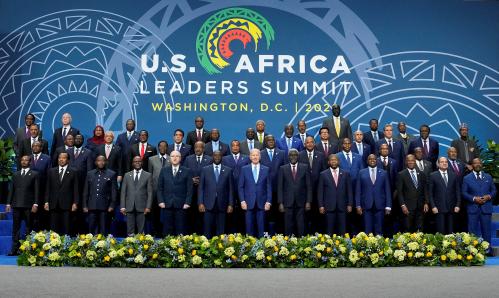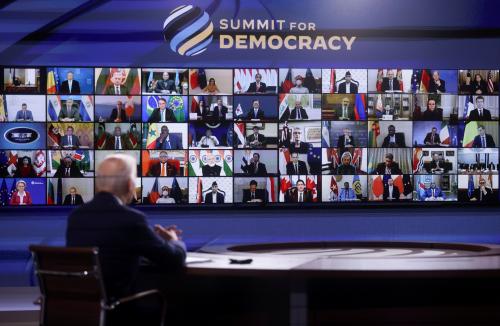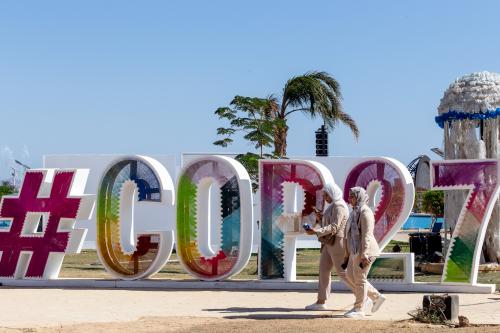United States Vice President Kamala Harris arrived in Ghana on March 26 to kick off her weeklong visit to three countries in Africa at a unique time in U.S.-Africa relations. Her visit comes in the wake of the progress achieved at the second-ever U.S.-Africa Leaders Summit, held in December 2022. The summit was the first tangible outcome of the Biden administration’s newly announced U.S. Strategy Toward Sub-Saharan Africa, which set the scene for the administration to reposition the U.S. as a valuable partner that reaffirms “African agency.” The summit brought together about 49 African heads of state and resulted in several major commitments from the United States including: a $55 billion pledge to support the African Union’s Agenda 2063; creation of a new Digital Transformation with Africa (DTA) initiative intended to invest over $350 million in financing Africa’s digital transformation; the appointment of Ambassador Johnnie Carson as the special presidential representative for U.S.-Africa Leaders Summit implementation; President Biden’s endorsement for the inclusion of the African Union (AU) as a permanent member of the G-20; and creation of the President’s Advisory Council on African Diaspora Engagement, among others.
While the commitments that emerged from the summit span many topics, including partnering on human rights, democracy, and gender inclusion, one topic that Vice President Harris should specifically highlight during her visit is deepening trade and investment between the U.S. and Africa. In addition to the $15.7 billion worth of private sector investments and partnerships reported by Prosper Africa during the U.S.-Africa Leaders Summit, the U.S. signed a memorandum of understanding to support the implementation of the African Continental Free Trade Area (AfCFTA), signaling a predominant focus on shifting from “aid to trade.” With the momentum rolling after a successful summit, it is critical that the vice president’s visit reiterate these priorities and that the administration continue to find ways to leverage America’s “core strengths” in private capital, advanced technologies, and soft power to implement these commitments nationally and continentwide.
Furthermore, at the global, national, and local levels, the vice president’s visit comes at a critical juncture in terms of advancing the implementation of the commitments from the U.S.-Africa Leaders Summit.
The global vie for a closer alliance with Africa
The world is dealing with the complex economic and political consequences of the Russia-Ukraine War and the geopolitical divisions it brings, including in Africa where many countries have remained neutral, if not closer to Russia for a minority. This global division and political polarization are being further exacerbated as the competition between the United States and China continues to heat up. China has significantly increased its influence on the African continent, with foreign direct investment (FDI) growing at a compound rate of 18 percent per year from 2004 to 2016 and Chinese lending reaching almost 20 times their FDI level. At the same time, the emergence of several middle-income countries has opened Africa to a number of alternative economic partners. This increase in partnership options has strengthened the leverage of African countries to advance their own development plans. Further bolstering their leverage is the implementation of the AfCFTA, which is accelerating regional integration, providing opportunities for investment in value chains across the continent, and enhancing international partners’ interest in investing. While international competition certainly plays a role in American interests, this visit should be used to reiterate the commitment made at the summit to real partnership, as well as to accelerate implementation of its key conclusions—rather than further the United States’ fight for global influence.
Resetting the US agenda for deeper and more long-term relations with Africa
At the national level, the visit is part of an ongoing effort for the U.S. to restructure its partnership with the African continent. With a divided Congress and continued disagreements about the U.S. budget, the Biden administration will have to work across the aisle to garner congressional support for implementing the summit commitments, which will likely require a new type of political strategy. As competition and tensions between the U.S. and China persist, the U.S. is hoping to demonstrate—through actions such as this vice presidential visit—that partnership with Africa is meant to be mutually beneficial and long term, and not solely a piece of a broader geopolitical game. In a briefing about the visit, a senior administration official doubled down on this by reiterating: “The U.S.-Africa Leaders’ Summit made clear that our relationship with Africa cannot, and should not, and will not, be defined by competition with China. The Vice President’s trip will illustrate that we have an affirmative agenda in Africa.”
What should the key priorities be in Ghana, Tanzania, and Zambia?
It is critical to understand the unique context of each African country that Vice President Harris is visiting in order to better understand the opportunities they provide for the U.S. to engage and find areas of mutual interest to partner on.
First, is Ghana, with which the U.S. has a warm and friendly relationship and which it regards as an important economic partner, with trade volumes between these countries exceeding $1.2 billion. Despite having a more diverse economy than many other countries in West Africa, Ghana is currently experiencing high levels of public debt and record-high levels of inflation accelerated by the war in Ukraine and the COVID-19 pandemic. Vice President Harris discussed the debt crisis and international frameworks to support debt relief and restructuring, economic reforms, and leveraging the significant Ghanaian-American diaspora in the United States to create shared prosperity, among others.
In Tanzania, Vice President Harris’ second stop, the focus should be on highlighting the progress the country has made in strengthening its democracy, on recognizing it as a global player (Tanzania’s 60 million people constitute the fifth largest country in Africa), and on demonstrating that it is a country that empowers women politically and economically. Both Vice President Harris and President Samia Hassan are the first women to serve in their respective positions, sending a powerful signal to the rest of Africa and the world that gender inclusion is a top priority for the United States. Next, Tanzania has high potential for greater U.S. investment across a range of sectors, perhaps most crucially in the digital sector—Tanzania has nearly 100 percent telecom voice penetration, although internet penetration has been slower, with less than 25 percent of the population connected. To truly promote a forward-looking partnership, investment in the digital sector and partnership with entrepreneurs already working in Tanzania should be given particular focus.
Finally, in Zambia, although the debt crisis will likely be a top conversation topic (Zambia became the first African country to default on its debt in 2020 with its debt burden reaching nearly $15 billion), Vice President Harris should use this visit to further existing and new investment commitments with Zambia. U.S. trade with Zambia has been low, but investor interest is growing, as evidenced by the U.S. Zambia Business Forum, which attracted hundreds of American and Zambian companies in a broad variety of sectors such mining, health care, and technology in 2022. There is significant potential for investment in the minerals essential for a green transition that the United States should focus on, especially by finding areas where value can be added within the country. For example, Zambia’s minister of finance identified the United States as an ideal partner to invest in ways to create finished products from copper that can support the green energy system.
In conclusion, the best way for the United States to advance mutually beneficial U.S.-Africa relations is to accelerate implementation of the commitments from the U.S.-Africa Leaders Summit, including by delivering on the $55 billion in tangible financial resources, carrying out the abundance of private sector commitments, empowering the U.S. Advisory Council on African Diaspora Engagement, and shepherding investments from the Digital Transformation with Africa Initiative. The three countries selected for the visit each offer unique opportunities to advance these commitments in a way that looks beyond competition and toward collaboration to advance mutual goals by focusing on each country’s strengths, whether in trade, peacekeeping, digital economy, gender inclusion, or another area.
Moving forward, the administration must work to ensure that visits such as Vice President Harris’ and President Biden’s later this year balance national and continental priorities and result in long-lasting relationships that will help both partners thrive economically, socially, politically, and globally.






Commentary
VP Kamala Harris’ visit to Africa: Delivering on US commitments or countering China and Russia?
March 30, 2023